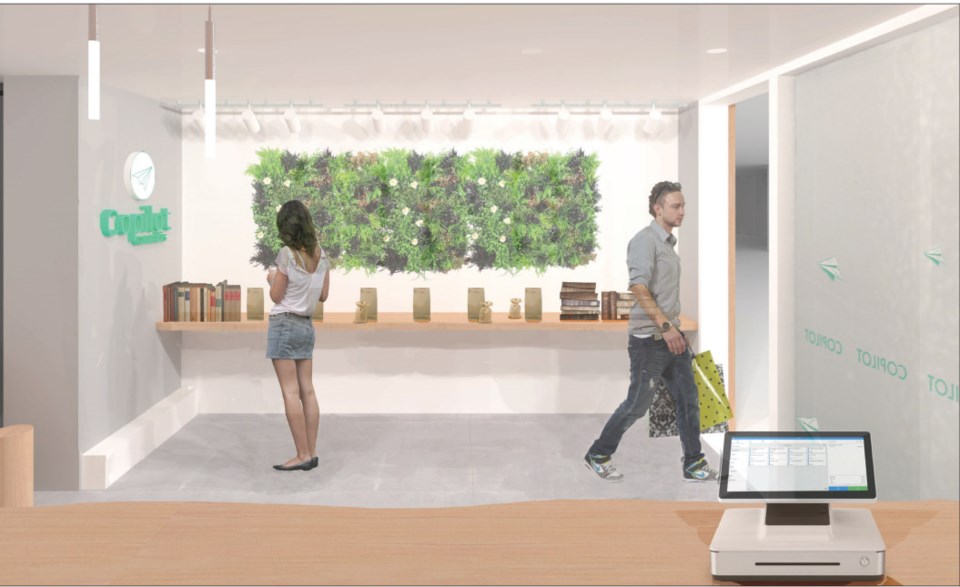Prince George city council gave preliminary approval for the world’s first airport cannabis retailer, despite opposition from Canada’s two largest airlines.
City council voted in favour of granting third reading to a bylaw to allow Copilot Cannabis to develop a cannabis retail store at the Prince George Airport, following a public hearing on Monday. Final approval of the rezoning will be withheld until the B.C. Liquor and Cannabis Regulation Branch grants approval for the cannabis license.
“This is a first, we’re setting an example right now,” Coun. Terri McConnachie said. “We have the opportunity to be the wind beneath these wings, or to say no. I am disappointed with the lack of engagement… (but) I am going to support this application.”
Coun. Cori Ramsay said the city’s role is to determine if a cannabis store is an appropriate land use at an airport. Cannabis licensing and rules around cannabis consumption and air travel are provincial and federal responsibilities.
Like many of her council colleagues, Ramsay said the fact that other Canadian airports already have cannabis consumptions areas, liquor stores and bars was a big factor in her decision to support the application. The support of the Prince George Airport Association for the application was also important, she said.
“To me, the precedent has already been set that this is an acceptable land use for an airport,” Ramsay said. “I know it’s strange going first. (But) looking 10-15 years down the line, I can see cannabis stores available in most airports in Canada.”
During a presentation to council, Copilot founders Reed Horton and Owen Ritz said that staff at the store would check boarding passes and only sell cannabis to people travelling domestically. In Canada, airline passengers can travel with up to 30 grams of cannabis or the equivalent.
In addition, the store would not sell cannabis to airport or airline staff, they said.
“One in four Canadians have already travelled with cannabis,” Ritz said.
Prince George Airport Authority CEO Gordon Duke said he acknowledged the concerns raised by the RCMP and other groups, and said safety is the airport’s top priority.
The airport intends to created a designated cannabis consumption area outside, away from the airport’s designated smoking area, he added. Smoking and consumption of cannabis inside will remain prohibited.
“The opening of this business will create some jobs and will provide a service to the rural area (around the airport),” Duke said.
INCREAESE IN 'UNRULY BEHAVIOUR' SEEN BY AIRLINES
During the public hearing on Monday, Air Canada director of local and provincial government relations Serge Corbeil said the national airline has concerns about cannabis sales in airports. Copilot’s business model is targeting the travelling public.
The airline’s priority is making sure their passengers entire journey is safe, he said. Cannabis raises a number of concerns because it can take longer for the full impairment to be felt, and it would be easier to bring it on board a plane and consume it than alcohol.
Many passengers travelling domestically from Prince George to Vancouver, then continue on to international destinations, Corbeil said, and may have two or three or more boarding passes.
“This could be highly problematic,” he said. “(And) while rare, there are instances where a flight may be domestic, but be diverted into the United States.”
Passengers who transport cannabis into the United States or other international destinations, even if accidental because they forgot it was in their baggage, could face serious legal consequences, Corbeil said.
Air Canada, WestJet and a group representing all the airlines using the Prince George Airport wrote letters opposing the cannabis store.
“We’re part of the reason an airport operates,” Corbeil said.
In a letter to city council, WestJet director of government and regulatory affairs Jared Mikoch-Gerke raised concerns about an increase in intoxicated, unruly passengers.The International Air Transport Association has reported a 55 per cent increase in unruly behaviour year over year, he said.
"WestJet, similarly, has also seen a significant increase in unruly behaviour of passengers, and in many cases the underlying cause is found to be intoxication. Unruly behaviour onboard an aircraft is a fundamental safety issue, where the most severe cases see passengers physically assaulting crew members or other passengers, and in some cases, attempting to open cabin doors or emergency exit windows, and resulting in the diversion of aircraft," Mikoch-Gerke wrote. "An aircraft cabin is not an appropriate place to be intoxicated..."
Intoxicants like cannabis can have a different effect on the human body in the lower-oxygen environment of a pressurized aircraft cabin. Copilot's proposed marketing strategy is functionally encouraging passengers to fly intoxicated, he added.
Both WestJet and Air Canada took issue with a cannabis store being named Copilot, which they said undermines the important jobs pilots and copilots do.
"The image that is portrayed by a cannabis store being named 'Copilot' is comparable to a liquor store that is named 'Designated Driver,'" Mikoch-Gerke wrote.
Coun. Kyle Sampson voted in favour of the proposal, but said the airlines should express their safety concerns to the provincial and federal agencies that regulate cannabis licences and air travel rules.
“Hearing from Air Canada and hearing from WestJet that they weren’t consulted enough, it’s distressing,” Sampson said. “They are the biggest airlines in Canada. We want them to continue flying into Prince George.”


